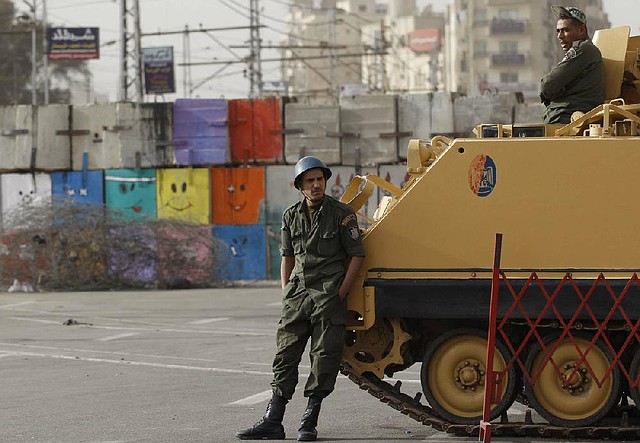Spokesman clarifies Morsi’s military order
Egyptian soldiers in an armored vehicle guard the front of the presidential palace in Cairo on Monday.
Tuesday, December 11, 2012
CAIRO — A day after President Mohammed Morsi formally directed the military to help keep public order and authorized soldiers to arrest civilians, a spokesman on Monday sought to draw distinctions between the order and the forms of martial law that the Egyptian army had previously imposed.
INTERACTIVE
The spokesman, Khaled al-Qazzaz, said the president had called upon the military for the limited purpose of protecting polling stations during the constitutional referendum to be held Saturday. He also said the president had instructed the army to refer any civilians arrested by soldiers to a civilian court for trial, instead of military tribunals, reversing the blanket authorizations that the Egyptian military has long demanded when it takes on a policing role in the streets.
“This is very different from what happened under the SCAF,” said al-Qazzaz of the Supreme Council of the Armed Forces, which ruled Egypt after former President Hosni Mubarak was ousted and until Morsi took over. “What the president did with the Cabinet is, anyone arrested will be referred to a normal judicial process and it will go to a normal civilian court. There will be no military trials.”
Heba Morayef, a researcher with Human Rights Watch, noted that the text of the order allowed the military to continue taking civilians to military courts.
“Had he wanted to,” Morayef said, “President Morsi could have stipulated that the military’s jurisdiction would have been limited in this case and that every civilian will be referred to a civilian court, but he chose not to.”
She also noted that the draft constitution specifically allows for the military to continue bringing civilians to military courts for trial if they disobey a military authority.
“As long as the military is deployed, the military has jurisdiction under the military code of justice,” she said.
After announcing its “complete rejection of the referendum” on Sunday, a coalition of the president’s opponents indicated Monday that it was still debating whether to call for a boycott of the charter or to campaign for a vote against it.
Major demonstrations are expected at the presidential palace again today and Friday - ensuring that questions about Egypt’s national unity and stability will continue to overshadow debate about the specific contents of the charter.
Information for this article was contributed by Kareem Fahim of The New York Times.
Front Section, Pages 6 on 12/11/2012
